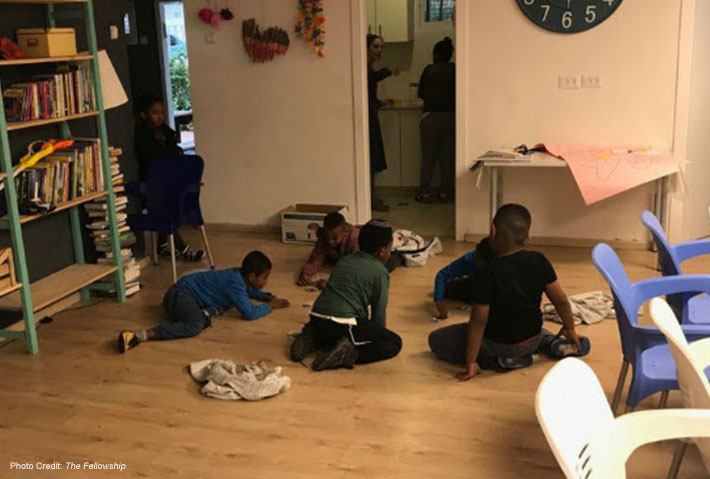-funded project called Afikim. As I walked into the afternoon centre, I fell in love with the place. It had the warmth and love of a home. The staff I met with were passionate about their work and the children who they help each school day.
“This place is essentially a home for children who don’t really have a home,” Hila said. “Many of these kids have no father, and the mother is all alone, working from morning to night. And so these kids have nobody to welcome them home when they get back from school, there is no lunch waiting for them, and their refrigerators are empty.”
It was troubling to hear the reality of these kids’ home lives.
“We had a girl who just joined us at the beginning of this school year. Every day we noticed that she would eat half her portion at lunch and wrap the other half with napkins to put in her knapsack,” Hila said. “When we asked her why she never ate her entire lunch she explained that her mother was hungry as well and she would bring half her lunch home so her mother could eat.”
Sadly, she wasn’t the first kid who was bringing food home for a parent or siblings. When there are leftovers, Hila will pack up the leftovers for these kids to take home to feed their family.
“Some of the stories we see here are very hard to talk about,” Hila said. “Some of the kids have a somewhat normal life at home, but the poverty is overbearing. Others are more unfortunate and have a very troubled home life.”
Gila is one of those girls. She was born to two olim (immigrants) from Britain. Gila, 11, and her older brother, 13, live with their mother and father in a tiny Jerusalem apartment.
“It’s hard for me to talk about Gila because this poor girl has endured so much pain her young life,” Hila explained. Gila’s parents are both mentally unstable, which Hila learned from social services.
Gila’s older brother is autistic, so he needs extra attention from his parents. But Gila’s mother works as an assistant to an elderly woman and does not get home before midnight. Her father works from home, but he doesn’t want to have much involvement in his children’s lives.
“The neglect at home was obvious. We knew about it even before Gila began to talk to us,” Hila explained. “She came to school extremely dirty, her fingernails were blackened with dirt, her hair always had lice, her clothes were torn, and she had an awful smell which made it impossible for other kids in the class to sit next to her.”
Thankfully, Gila has attended this afternoon center for two years, and she makes slow and steady progress. “For the first few months that Gila came to the program, we were happy just to see her have a healthy hot lunch every day. Then we provided her with therapy to teach her how to take care of herself, just learning basic hygiene skills that most kids learn at home. Then we started helping her with schoolwork.”
Gila is learning how to care for herself, and she’s made new friends!
“These kids need a home, they need love, and they need attention,” said Hila. “After homework, there’s always one child who will ask to drink hot cocoa and have a staff member play a board game with them, the kind of thing parents are supposed to do with their kids.”
I thank God that
The Fellowship


